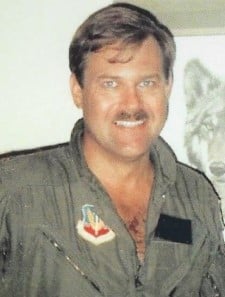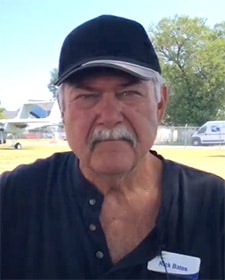“On 5 October 1972, while flying as a WSO in an F-4E on a fast fac (Wolf fac) mission, Martin-Baker saved my life. We were hit while doing 500 plus knots at about 2500 feet with about three “g”s on the jet. The seat worked perfectly. I lost my helmet, my gloves and my watch, and blood came out the pores of my hands. I landed with no problem except for all the north Vietnamese around me. I spent the next six months as a POW eventually arriving at the Hanoi Hilton.
After my repatriation I attended USAF pilot Training and was again assigned the F-4 which I flew for the next twenty years. I never thought twice about my safety. The seat was my best friend. I ended up with a bit more than 2,500 hours in the phantom.
After I retired from the Air Force I went to work for a defense contractor. I mostly flew F-100’s that my company had bought from the Danes. I’m sure you know that as soon as the Danes got the jets they removed the North American seats and installed Martin-Baker seats. These were the old ballistic seats with the blue and gold lanyards. I logged about 650 hours in those jets.”
So you can see I’m partial to you product. I even have the Bremont watch with a red barrel. I thank you for saving my life… keep up the good work.” (1)
Rick Bates telling his story for the Martin-Baker Ejection Tie Club.
DAKOTA DATEBOOK: Richard Bates, POW
By Merry Helm
Mar 29, 2022 Updated May 13, 2023
March 29, 2022 — On this date in 1973, the Viet Cong released First Lieutenant Richard Bates of the U.S. Air Force. While flying a mission nearly 6 months before, he was shot down over North Vietnam and taken prisoner. Bates was from Plaza, ND, and was 24 when he was captured. This is the story he told:
“I was shot down 05 October 1972 while flying as a Forward Air Controller in an F-4 over North Vietnam. Our aircraft was hit by anti-aircraft fire as we made a low pass to check out a possible target. The plane became uncontrollable almost immediately and my aircraft commander Jim Latham and I were forced to eject. I was captured immediately. I could hear bullets whizzing by me as I came down in the ‘chute,” Bates said. “My first thought was, ‘It’s going to be a very long day.’ My next reaction was to pray for my wife.
“The first afternoon I was paraded around the villages near Dong Hoi (the village in the southern part of North Vietnam where I was downed) and the civilians took turns hitting, kicking, spitting and stoning me. It was like running the gauntlet for four hours. For the next 35 days I was kept in the tunnel way entrance to a concrete ammo bunker. It was a 3 feet high, 3 feet wide and about 7 feet long. I was also bound hand and foot.”
Bates continued, “It was this time of cramped solitary that was the worst for me. Because we flew alone, had to eject so quickly and were captured immediately, I knew that I was an MIA (missing in action). I worried a lot about my wife and family. I finally found comfort in prayer. I would pray for any reason. When I did not have any special prayer, I would say The Lord’s Prayer or the 23rd Psalm. I said them a thousand times.”
“I was worried why I wasn’t being moved to Hanoi,” Bates went on. “I also worried about my own well being for five days at the end of October as U. S. air strikes landed on top of my position. One of my guards sitting next to me received wounds in the head and leg during one raid.
“Finally, the trip north began and I saw Jim, my aircraft commander. In fact, we were shackled together with leg irons for three weeks! But we were together. We talked much. We got our stories straight about what we would say or wouldn’t say. We also played gin rummy with a deck of cards I made out of pieces of paper. Jim won 8,200 to my 4,800.”
Bates went on to say that they finally arrived in Hanoi sixty days after being shot down. In Hanoi, Bates and Jim Latham were separated there, and Bates spent eleven days solitary. It was the first time they’d seen soap and toothpaste in two months.
Bates finished his story with, “The December bombing of Hanoi was a beautiful, but a little terrifying, sight to us. We saw two B-52’s shot down. But we knew our country was standing firmly behind us. The last sixty days were the very longest. I was in the last group released. The reception at Clark AFB and back in the U.S.A. reaffirmed what I knew all along – that my country had not forgotten me and was behind me all the way. I was only doing my duty to my country and have no regrets about any of it. My hope is to keep serving and I hope I can do America justice.”
That was Plaza native Richard Bates’ story of his experience as a POW during the Vietnam War. He stayed in the air force until November 1996, when he retired as a Major.(1)





